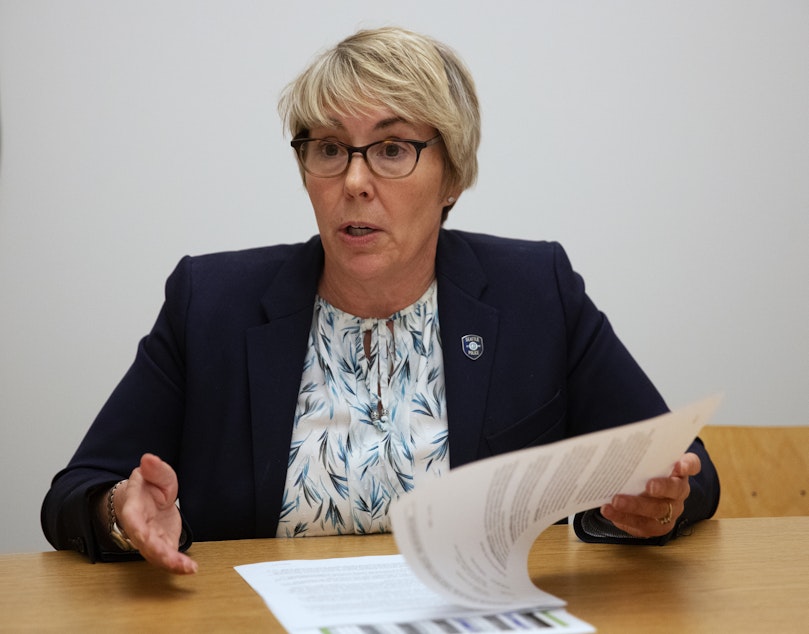Seattle police sergeant investigated over leaked sex assault memo

Findings from a Seattle police watchdog investigation have cleared a sergeant accused of leaking an internal memo to the media and show it was police leadership who initiated the probe.
With the backing of Police Chief Adrian Diaz, Assistant Chief Deanna Nollette filed a complaint against a sergeant who wrote a memo outlining severe understaffing in the department’s sexual assault and child abuse unit, according to investigation documents obtained through a public records request.
Sgt. Pamela St. John, head of the department’s sexual assault unit, sent a memo to her superiors and Diaz in April describing how the unit had been forced to stop investigating adult sexual assault cases because of the lack of staff, which potentially jeopardized timely prosecutions and left victims in limbo.
After KUOW and The Seattle Times published a story about the memo in June, the Office of Police Accountability launched a leak investigation into St. John. The investigation took months and was concluded in November without identifying the source of the leak. The civilian-led office found the allegations unsustained because evidence was inconclusive. Nothing showed that St. John leaked the memo, and multiple people inside and outside the department were found to have had access to it.
Sponsored
The Seattle Police Department has lost a significant number of officers and faced increased public scrutiny after the 2020 racial justice protests. Leak investigations rarely result in finding the sources of the leaked information but do stoke fear among employees.
The department did not respond by deadline to a request for comment on the leak investigation and Diaz’s role in it.
The case summary has not been published to the OPA’s website. KUOW and The Seattle Times obtained the investigation findings through a public records request.
Any member of the public can file a complaint with the OPA, an office within the department that conducts police misconduct investigations and makes recommendations to the chief of police. The investigation showed Nollette initiated the leak investigation a day after Nollette’s interview with reporters about the memo.
The watchdog’s interview with Nollette shows the public airing of the memo frustrated police leadership, who had diverted detectives from several investigative units to patrol duty as a new mayoral administration promised more policing of street crime and to clear public spaces of homeless encampments.
Sponsored
Nollette, the former head of the sexual assault unit who oversees the department’s criminal investigations bureau, told investigators that the publication of the memo created “an inordinate amount of work” and “a lot of outside scrutiny and a lot of criticism for sensible business practices,” according to the OPA investigator’s report.
After Nollette was questioned by reporters about the memo in May, Nollette met with Diaz and told him “it was a contentious interview and would essentially be a hit piece,” the report reads.
“She told him it was obvious someone in the unit was feeding them information,” it continues. Nollette and Diaz then “agreed that was a violation of policy and should be referred to OPA.”
Seattle police policy prohibits leaking information to the media without authorization, though investigations into alleged leaks are uncommon. The last time The Seattle Times covered a Seattle police leak investigation was in 2012.
Riddhi Mukhopadhyay, executive director of Seattle-based nonprofit Sexual Violence Law Center, said Tuesday she was grateful to St. John for writing a memo that highlighted the needs of sexual assault detectives.
Sponsored
“It was an opportunity for leadership to recognize that and respond to it in a thoughtful way,” Mukhopadhyay said. “It's unfortunate that it was instead a basis to launch an investigation into the author of the memo.”
In June, Mukhopadhyay said it was “shameful and disappointing” the department would devote resources to the leak investigation while it claimed it had too few people to investigate sexual assaults.
After the KUOW and Seattle Times story about the memo, Mayor Bruce Harrell issued an executive order that instructed police leadership to assign languishing felony cases with “sufficient evidence” to detectives and called for a review of the Police Department’s handling of major crime investigations, including those within the sexual assault unit.
At the time of publication, Seattle police had not provided metrics on the progress of sexual assault investigations.
Mary Ellen Stone, CEO of the King County Sexual Assault Resource Center, said calls from victims describing stalled cases have tapered off in recent months. An advisory committee with sexual assault advocates is scheduled to begin meeting with the city in January.
Sponsored
Advocates say they are encouraged by this and other steps the city is taking but say it’s still too early to tell if the moves made by the city in the wake of the memo’s publication will result in better outcomes for victims.
“I think in a couple of months it'll be more telling if the steps being taken right now are having a meaningful impact for the survivor community,” Mukhopadhyay said.
In September, after a national search, Harrell chose Diaz as permanent police chief. The Seattle City Council will vote on his appointment during the Jan. 3 council meeting.


